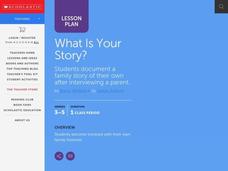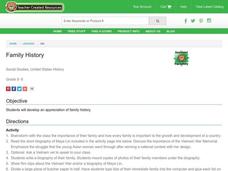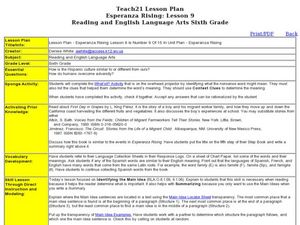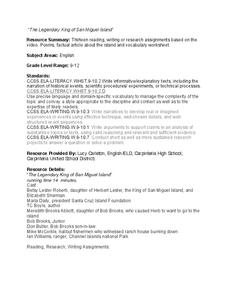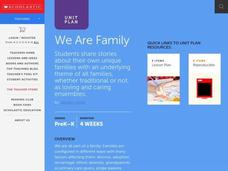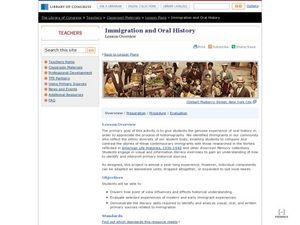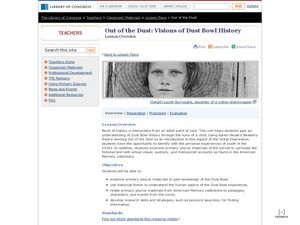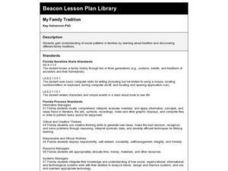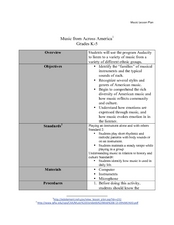Curated OER
What is Your Story?
Students conduct an interview with a member of their family in preparation for writing their own family histories. They listen to their teacher's family story, and listen to the book "Picnic in October." Students then conduct their...
Curated OER
Discovering My Family History
Students research their family trees. They research Internet sites, conduct interviews and, when possible, access primary sources to compile information about their family's history. Students present their findings in a family tree.
Curated OER
A Family Recipe and Recollections Cookbook Project
Learners create a family cookbook to record special family memories and collect important recipes. In this family traditions lesson, students create a cookbook of memories, stories, and favorite recipes. Learners present their cookbooks...
Curated OER
Family History
Students appreciate how families are important to the expansion and progress of a country. In this biographies lesson, students read a biography and write their biographies including photos. Students create family trees.
Curated OER
Esperanza Rising: Lesson 9
Sixth graders explore culture by reading a book with classmates. In this Hispanic history lesson, 6th graders read the story First Day in Grapes, and discuss the tough lives of migrant workers. Students answer study questions after the...
Museum of Tolerance
Cultural Research Activity
Class members explore cultural diversity through a variety of texts that showcase the importance of traditions. Then, they interview their family members to research their own cultural background and write their findings on quilt...
Curated OER
Intergenerational Interviews
Students develop questions to ask their famiy members to discover their family history. Individually, they conduct the interview and videotape if possible. To end the instructional activity, they draw a picture of the person they...
Channel Islands Film
The Legendary King of San Miguel: Lesson Plan 3 - Grades 9-12
The documentary, The Legendary King of San Miguel Island, introduces the fascinating tale of Herb Lester, his family, and their life on San Miguel Island. Viewers have an opportunity to expand their study of the island and of...
Curated OER
How to Make Homework Meaningful
Enrich classroom experiences and engage young learners by assigning purposeful, student-centered homework activities.
Curated OER
Oral Genealogy
Learners research their family histories by conducing interviews with parents and grandparents. They put their histories into a chant or a chart/family tree and present it to their class.
Curated OER
We Are Family
Students participate in a class discussion about their family structures. Students also discuss the family diversity of their peers and others in the world. They investigate family habits, family history, values and traditions their...
Curated OER
Immigration and Oral History
Students examine immigration. In this oral and social histories lesson, students analyze primary sources to research immigration history in their community. In this year-long research project, students participate in visual and...
Curated OER
Out of the Dust: Visions of Dust Bowl History Lesson Overview
Young scholars complete activities with the book Out of the Dust by Karen Hesse. In this literature activity, students read this story and view the Dust Bowl history from the eyes of a child. They discover the Great Depression and...
Curated OER
You Mean I Am Part of History?
Fourth graders open the lines of communication between family members and to gain a historical understanding about family history. They research and interview their grandparents and parents and create a research paper.
Curated OER
My Family Tradition
Students examine different family traditions to further explain social patterns. They complete a graphic organizer using educational software.
National Park Service
The Young Naturalist
Beginning with a brief history of our 26th president, Theodore Roosevelt, then followed by a discussion of his interest in nature, young scientists take to the outdoors to locate and observe local plants and insects....
Stanford University
Explosion of the Maine
An intriguing lesson features newspaper articles to help academics understand the political impact of the sinking the Maine and how the American media depicted the event. Scholars also view a presentation, participate in group...
Curated OER
Music from Across America
Young scholars complete a unit of lessons on a variety of types of American music. They record their impressions of music samples on a worksheet, identify types of instruments, and choose a musical selection for their family to respond to.
Curated OER
Family History
Fourth graders identify primary source items in the study of their families. They relate the importance of primary source materials in understanding history and events of the past.
Curated OER
Record and Preserve Your Family Stories
Students research and create a presentation about their own culture and personal history. They interview family members to increase their awareness of family events and documents. They create a family tree at a web based resource.
Curated OER
Oral traditions: Facilitating education through verbal traditions
Bring oral traditions into the classroom to engage learning and facilitate best practices. From story telling to listening skills, this article provides reasons and rational behind oral traditions as a tool for education.
Global Oneness Project
The Value of Ancient Traditions
Imagine having to give up cell phones, computers, and TV? What would be lost? What gained? An examination of the Drokpa, a nomadic people who live in the grasslands of Tibet, provides class members an opportunity to consider how access...
Curated OER
Paint's Family Tree
Fifth graders learn about hereditary traits and family trees. In this heredity lesson, 5th graders act out a family tree skit and complete a 'trait summary' worksheet. Students then complete the 'Paint's Family Tree' worksheet. Students...
Curated OER
Making a Family Tree
Students, in groups, produce a family tree using computers to facilitate research and presentation. They plan, discuss and evaluate different technologies used in this assignment.


